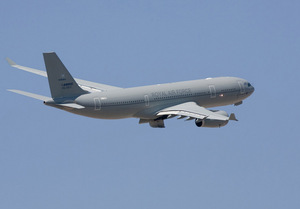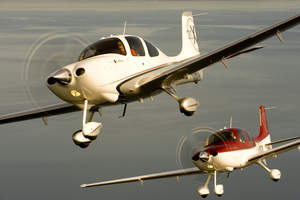Raytheon Awarded $30 Million for Space Fence System Design and Prototyping
July 15, 2009
TEWKSBURY, Mass., July 15, 2009 /PRNewswire/ — Raytheon Company (NYSE: RTN) was awarded one of three $30 million contracts for Phase A system design and prototype of the Space Fence system. Space Fence will provide the U.S. Air Force enhanced space surveillance capability to detect and report space objects.
“Space Fence is the future of space situational awareness,” said Pete Franklin, vice president for Raytheon Integrated Defense Systems’ National & Theater Security Programs. “This sensor will have the capability to detect and track very small objects in low Earth orbit.”
The Space Fence program is a multi-phase acquisition leading to the delivery of up to three globally positioned S-band radars capable of interoperation with the Space Surveillance Network. The system will ensure there is no gap in capability as the current systems in the network reach the end of their life spans. Delivery of the first radar system is expected in 2015.
Integrated Defense Systems is Raytheon’s leader in Global Capabilities Integration providing affordable, integrated solutions to a broad international and domestic customer base, including the U.S. Missile Defense Agency, the U.S. Armed Forces and the Department of Homeland Security.
Elbit Systems to Establish Mission Planning Center for Israeli Air Forces Fighter Pilots
July 15, 2009
The Project is Valued at $55 Million and Will Include Instruction and Maintenance Services
HAIFA, Israel, July 15 /PRNewswire-FirstCall/ — Elbit Systems Ltd. (NASDAQ: ESLT) announced today that it was awarded a contract from the Israeli Ministry of Defence for the establishment of a mission planning center for the Israeli Air Force’s (IAF) pilots of F-16C/D and F-16I fighter aircraft.
The center will be operated through a PFI (Private Financing Initiative) concept, and will include, among others, a development phase as well as instruction and maintenance services for duration of 15 years. The project is valued at approximately $55 million, subject to necessary approvals during the project.
The new mission planning center marks a significant breakthrough in the operational training sector. The system enables training in various mission scenarios in varying operational zones and in the relevant threat environment of each zone, a new training capability which has not yet been available to the IAF.
With its high quality operational training capabilities, the new center will allow the IAF to operate some of the training sorties onboard the trainers, instead of the fighter jets, thus allowing maximized use of existing resources.
Ran Hellerstein, Co-General Manager of Elbit Systems’ Aerospace Division, noted: “The mission planning system was developed in line with the modern combat doctrine that calls for the operation of multiple forces and thus requires interoperable training. We take great pride in the IDF’s selection and trust that Elbit Systems’ vast experience in the training of air and ground forces and UAV operators, as well as our interoperability aptitude and accumulated experience in private funding initiatives, will result in the most suitable solution for the IDF.”
First Airbus A330 Ready for Conversion to U.K.’s Future Strategic Tanker Aircraft
July 15, 2009
ARLINGTON, VA–(Marketwire – July 15, 2009) – The first Airbus A330 aircraft platform slated for the United Kingdom’s Future Strategic Tanker Aircraft (FSTA) program has arrived ahead of schedule to begin its conversion into a Multi-Role Tanker Transport (MRTT) at Airbus Military facilities in Madrid, Spain.
The Royal Air Force (RAF) tanker uses the same basic airframe as Northrop Grumman’s KC-45, which is proposed for the U.S. Air Force’s tanker fleet modernization. EADS North America is a principal subcontractor with responsibility for delivering the KC-45 aircraft platform, which will be produced at a new aviation center of excellence to be built in Mobile, Ala.
“This early delivery once again underscores EADS’ ability to provide the most capable platforms to meet the most demanding aerial refueling and airlift requirements of military services worldwide,” said Ralph D. Crosby, Jr., EADS North America’s Chairman and CEO.
The United Kingdom’s FSTA program involves the acquisition of 14 A330 MRTT-based tanker/transports for the RAF. With a service entry planned for 2011, the new aircraft will progressively replace the country’s fleet of aging VC-10 and TriStar refueling aircraft.
In addition to its selection for the United Kingdom’s tanker requirement, the A330 MRTT has been chosen by the air forces of Australia, Saudi Arabia and the United Arab Emirates.
Three A330 MRTTs currently are in the military certification or conversion process for the Royal Australian Air Force. Australia is acquiring five of the aircraft, which will extend the range and endurance of its fighters with aerial refueling support, and provide long-range airlift for transportation of troops and cargo. The Royal Australian Air Force is to begin operational service in 2010 with the aircraft, which will be designated the KC-30 Tanker.
Cirrus Aircraft and Aerospace Products International Sign Exclusive Logistics Services Agreement
July 15, 2009
DULUTH, MN and MEMPHIS, TN–(Marketwire – July 14, 2009) – Cirrus Aircraft and Aerospace Products International, Inc. (“API”), a wholly-owned subsidiary of First Aviation Services Inc. (PINKSHEETS: FAVS) and a leading supplier of innovative distribution and supply chain services for the aviation industry, signed a multi-year exclusive logistics services agreement to support Cirrus owners, operators and service centers worldwide. This preferred services agreement marks a key initial milestone in Cirrus Aircraft’s “Cirrus Experience” initiative to achieve world-class customer service and support through the complete lifecycle of the aircraft ownership experience.
Under the brand Cirrus Parts by API©, API will provide all field supply chain services and logistics solutions for Cirrus Aircraft spare parts and related materials in support of the SR-Series piston aircraft product line. Additionally, API will manage procurement and parts inventory for the field, forecast all spare parts demand and plan global inventory levels in order to provide guaranteed spare parts availability of Cirrus Aircraft parts to the global network of Cirrus Aircraft Authorized Service Centers. API will also handle customer returns, manage all rotable exchanges, and administer warranty claims and parts replacements on behalf of Cirrus Aircraft. Cirrus customers will benefit from API’s 24-hour per day service, one-stop shopping for all aircraft parts needs and 12:00 a.m. Eastern Standard Time order cut-off for same-day shipping.
Brent Wouters, Cirrus Aircraft President and Chief Executive Officer, noted the importance of the new partnership and the enhancement it will provide to Cirrus Aircraft customer service: “Much of Cirrus’ past growth and success has been the result of innovative aircraft designs, new customer relationships, and key supplier partnerships. Our future success will depend on continuing with those initiatives while we also focus on strong customer loyalty and satisfaction. This new agreement with API represents a strategic relationship that addresses a critical component of providing world-class support and services. We explored all the available technology in the aerospace aftermarket and support industry and chose what we believe to be the most innovative solution to servicing our aircraft. This program goes beyond anything previously provided to aircraft operators and we are very pleased to be partnering with API.”
“The API-Cirrus Agreement formally joins two of the most innovative companies in General Aviation, a combination that will set new standards for aftermarket product support and sustainment in the aerospace industry,” said Dr. Ahmed Metwalli, API’s President and Chief Operating Officer. “API is committed to deploying our state-of-the-art supply chain capabilities to provide world-class, personalized customer service to Cirrus owners, operators and service centers. For API, this agreement is a major milestone in the expansion of our long-term Supply Chain Management Programs with leading aerospace OEMs worldwide.”
Dassault Delivers its 2000th Falcon to Koç Holding
July 15, 2009
BORDEAUX-MERIGNAC, FRANCE–(Marketwire – July 15, 2009) – Today, Dassault Falcon celebrated a major milestone in the history of the Falcon aircraft family, with the delivery of its 2000th Falcon at the Bordeaux-Mérignac facility. Since the first delivery of the Falcon Mystère 20 in 1965, the Falcon fleet has logged more than 14 million flight hours and 17 different versions of the Falcon aircraft have been designed, produced and delivered in 67 countries.
“Delivering our 2000th Falcon is more than a celebration of success,” declared John Rosanvallon, President and CEO of Dassault Falcon. “It’s a confirmation that all the qualities we’ve been building on since the Falcon Mystère 20 are essential to great flying. Today, Falcons are recognized worldwide for their spacious comfort, unbeatable performance and unsurpassed value. And they are, by far, the most fuel efficient in their class which means lower emissions”.
The 2000th Falcon, a 2000LX was delivered to Koç Holding. Based in Istanbul, Koç Holding is the largest company in Turkey and a leader in both domestic and international markets. The company is among the top 50 companies in Europe and a member of the Fortune Global 200. The group focuses its operations on four core industries: energy, automotive, durable goods and finance and is active in 24 countries, in Turkey, Europe, the Middle East, and China.
“We could not grow our business without our airplanes,” declared Mustafa V. Koç, Chairman of Koç Holding. “The Koç Group of companies is spread out with production facilities and dealer networks throughout the world. The business demands fast and efficient travel and our airplanes represent indispensable assets to our company growth.” The 2000LX is the newest member of the Falcon family of business jets. Koç Holding also owns a Falcon 2000 and holds an order for a Falcon 900LX, to be delivered at the end of 2011.
“The Falcon 2000LX offers the lowest operating costs of any airplane in the large cabin class and is an ideal business tool for global companies like Koç Holding,” said John Rosanvallon. “Sharing this occasion with Koç Holding is remarkable not only because they are among our most faithful customers but they are also a highly respected member of the business community.”
The 4,000 nm range 2000LX offers the same spacious, quiet interior as the 2000EX EASy but has the capability to serve a more extensive list of city pairs. The 2000LX can connect New York to Moscow; Mumbai to London; Paris to Delhi and Hong Kong to Brisbane non stop. It also offers a 10 to 15% climb speed improvement (over the Falcon 2000EX) allowing it to reach 41,000 ft in just 18 minutes. The Falcon 2000LX comes standard with the award-winning EASy flight deck which has won high marks and praise for its integrated features and intuitive displays.
The Falcon 2000LX is powered by the same highly reliable Pratt & Whitney Canada PW308C engines as the 2000EX. The PW308C is rated at 7,000lbs thrust (ISA + 15C) and recently passed 220,000 flight hours on the Falcon fleet.
WestJet ayuda a los ciudadanos mexicanos afectados por las nuevas regulaciones sobre visas La aerolínea no aplicará cargos por cambio y cancelación para dar tiempo a que los ciudadanos de México obtengan las visas
July 15, 2009
CALGARY, Canadá, 14 de julio /PRNewswire/ -- WestJet anunció hoy un
programa para permitir a sus pasajeros mexicanos tiempo suficiente para
obtener visas de residente temporal según las nuevas regulaciones del gobierno
canadiense dadas a conocer ayer.
"Sin dudas estas nuevas regulaciones han tomado por sorpresa a nuestros
pasajeros mexicanos, y probablemente muchos tendrán que cambiar o cancelar sus
vuelos," señaló Bob Cummings, vicepresidente ejecutivo de Experiencia de
Pasajeros y Marketing. "Simpatizamos con su situación y queremos ayudar
suspendiendo la aplicación de nuestros cargos por cambio y cancelación de
forma que puedan volver a reservar sus vuelos y tener el tiempo que necesitan
para obtener sus visas."
Los ciudadanos mexicanos que actualmente tienen reservaciones para volar
en WestJet a Canadá, entre ahora y el 15 de agosto de 2009, que deseen cambiar
o cancelar su vuelo mientras consiguen una visa de residente temporal pueden
hacerlo hasta el 31 de julio de 2009.
Se ruega a los pasajeros que llamen al Super Centro de Ventas de WestJet o
a su agente de viajes. Para comunicar con el Super Centro de Ventas desde
México, llame al 001 800 514 7288. Desde Canadá o Estados Unidos, llame al 1-
888-WESTJET (937-8538). Si el viaje se vuelve a reservar a un precio menor, la
diferencia será depositada en un crédito para viajes futuros. Si el viaje se
vuelve a reservar a un precio mayor y los vuelos se toman antes del 15 de
agosto de 2009, WestJet aceptará el precio al que se compró originalmente.
WestJet está contactando a sus pasajeros mexicanos por teléfono y correo
electrónico así como a través de las agencias de viajes mexicanas para
informarles de este cambio. Como un paso adicional, WestJet traducirá al
español este comunicado de prensa y lo distribuirá a medios de difusión en
Puerto Vallarta, Cabo San Lucas y Mazatlán, las ciudades a las que sirve en
México como parte de su cronograma de verano.
Mooney Ovation2 GX Receives EASA Certification
July 14, 2009
Kerrville, Texas—Mooney Airplane Company has announced that the M20R Ovation2 GX has received its certification from the European Aviation Safety Administration (EASA). This long-range single-engine piston aircraft cruises at a top speed of 190 knots (ktas) at its service ceiling of 20,000 feet. At a lower cruising speed of 173 ktas, it offers an incredible range of 1,860 nm.
“The Ovation2 GX is perfectly suited for Europe, whether as a business aircraft with comfortable seating for four people and their luggage, or for personal use, allowing fast, convenient trips to anywhere in Europe in a matter of hours,” said Bernard Cheong of Air Touring Limited, one of Mooney’s European dealers. “With the installation of optional long range tanks, the range can be pushed even further, to 2,400 nm,” he added.
This certification represents the qualification of the Ovation2 GX with the Garmin G1000 Avionics Suite, which was certified in the US in 2004. The M20R Ovation has been certified in Europe without the glass panel on a per country basis prior to this EASA announcement.
The Ovation2 GX is one of three production aircraft in the Mooney fleet, which includes the Ovation3 and Acclaim Type S – the fastest piston single on the market. The Ovation2 GX is powered by a 280 horsepower TCM TSIO-550-G normally-aspirated engine and comes standard with the Hartzell three-blade propeller.
The newly-certified Ovation2 GX aircraft are currently available through Mooney’s international dealer network in Europe: Air Touring Limited covers Germany, Austria, Switzerland, the UK and Ireland. AirNet, based in Slovenia, covers Eastern Europe and Troyes Aviation, based in France, also covers Spain, Portugal, Italy and Belgium. Customers can find information on all Mooney models and their nearest European dealer at www.mooney.com.
Lockheed Martin to Develop Concept for New U.S. Navy Air and Missile Defense Radar
July 14, 2009
MOORESTOWN, N.J., July 14 /PRNewswire/ — The U.S. Navy has awarded Lockheed Martin (NYSE: LMT) a $10 million firm-fixed-price contract to perform concept studies for the Air and Missile Defense Radar (AMDR), a scalable solid-state radar suite for future surface combatants.
Comprised of an S-Band radar, an X-Band radar and a Radar Suite Controller (RSC), AMDR is intended to significantly enhance a ship’s defensive capability against advanced anti-ship and ballistic missile threats. Lockheed Martin was one of three industry teams to receive AMDR contracts, which will focus on the S-Band radar and RSC during this six-month concept studies phase. The Naval Sea Systems Command in Washington, D.C., leads the procurement for AMDR.
Under the contract, Lockheed Martin will evaluate potential system configurations. Subsequent phases, including technology development, engineering and manufacturing development, production and follow-on support, will be the subject of future competitive procurements. The work will be performed at Lockheed Martin’s Moorestown, NJ facility.
Lockheed Martin is a leader in S-Band radar system development and production. With more than 100 operational systems deployed worldwide, Lockheed Martin supports a range of naval radar programs providing advanced anti-air warfare and ballistic missile defense mission capability.
“AMDR will provide a scalable radar suite that will deliver enhanced capability against evolving threats for current and future ship platforms,” said Carl Bannar, vice president and general manager of Lockheed Martin’s Radar Systems. “Through our established partnership with the Navy, Lockheed Martin will build on our 30-year naval radar heritage to meet the challenging mission requirements envisioned for AMDR with an open, capable, and affordable system solution.”
Lockheed Martin Awarded Apache Performance Based Logistics Follow-on Contract
July 14, 2009
ORLANDO, Fla., July 14 /PRNewswire/ — The U.S. Army awarded Lockheed Martin (NYSE: LMT) a follow-on Performance Based Logistics (PBL) contract to support the Target Acquisition Designation Sight/Pilot Night Vision Sensor (TADS/PNVS) and Modernized TADS/PNVS (M-TADS/PNVS) systems on the AH-64 Apache helicopter. The contract has a potential value of $89 million for 2009.
The original PBL contract, awarded in early 2007, established a system of continuous improvements supporting the AH-64 Apache TADS/PNVS and M-TADS/PNVS programs. The PBL contract provides complete post-production supply chain management, including spares planning, procurement, repairs, maintenance, modifications and inventory management of fielded systems. The value of the first year of the contract was $117.8 million and the 2008 contract was worth $76.6 million.
“PBL is a strategy for system product support that employs an integrated, affordable performance package designed to optimize system readiness,” said Dave Belvin, Apache TADS and Support Programs director at Lockheed Martin Missiles and Fire Control. “PBL is intended to save operating and support costs by having the prime contractor assume responsibility for the total performance of a system. Our team is in position and is providing a cost-effective support solution that meets the needs of our Warfighters.”
As part of Lockheed Martin’s centralized logistics management, damaged components are expedited directly back to a repair center, significantly reducing the length of the supply pipeline and enabling the U.S. Army to receive spare parts more quickly and efficiently. Lockheed Martin’s PBL supply management reduces operation and support cost burdens, providing funds for continuing system modernization and reliability improvements. To date, the Apache TADS/PNVS PBL program has been credited by the U.S. Army Aviation and Missile Command with improving fleet readiness, requisition fill rates, and reducing the U.S. Army’s life cycle cost.
“This PBL program is a partnership with the Army and industry that leverages the strengths of the collective organizations to provide the best possible performance outcomes. The success of the program is based on continuous improvement,” said Belvin. “The program continues to be innovative to meet our customer’s challenging and rapidly changing objectives.”
Global Airline Capacity Continues to Stabilise, Reports OAG, as July Figures are Released
July 14, 2009
Decline is Just One Percent Compared to July 2008
LONDON, July 14 /PRNewswire-FirstCall/ — One year on since the world’s airlines began to curb their seat capacity in the face of global economic pressures, the cutbacks are starting to stabilise with just over 315 million seats on offer this month, a drop of just one percent over July 2008 levels, reports OAG, ( http://www.oagaviation.com), the world’s leading aviation data business, as it releases its monthly report on trends in the supply of airline flights and seats.
David Beckerman, vice president OAG Market Intelligence, said,
“Airline capacity is often cited as a barometer of economic confidence. Carriers adjust their fleet and services in anticipation of market demand for air travel, which is vulnerable to corporate cost management and to disposable income of leisure travellers at times of financial uncertainty.
“The OAG figures, which amalgamate the planned operations for airlines worldwide, show a clear and very welcome upward trend from the dramatic declines we have seen in recent months. We can only wait and see if this outlook bears financial fruit in actual passenger numbers and airline load factors.”
The world’s airlines have scheduled a total of 2.55 million flights for July 2009, down by 3% compared with the same month last year, with a drop in capacity of 3.3 million fewer seats on offer to travelers around the globe. Last month, the year-on-year global frequency and capacity figures were down by 4% and 2% respectively.









